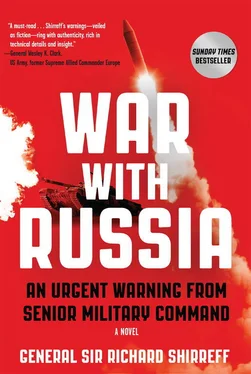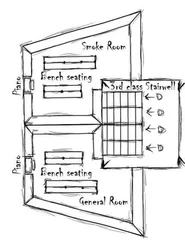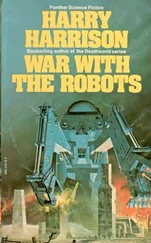The President grunted, sat up and wrapped his towel around his waist. Despite the elation felt throughout the nation at the dramatic sinking of HMS Queen Elizabeth , it had not been an easy week, largely due to the humiliation of becoming an international laughing stock. Komarov was pleased to see that the banya and birching had improved the President’s mood. He looked at the hour-glass by the door; time for the cold plunge pool.
Thirty minutes later, the President, clad in a white, towel bathrobe, sat in the rest area while his live-in mistress, a thirty-five-year-old, willowy former Olympic gymnastics gold medalist, brought him a glass of kvass , the slightly fizzy, sweet-sour, banya recovery drink made from rye bread and flavored with mint so beloved by Russians. Despite the war in the Baltic states, the declaration of Article 5 by NATO precipitating war with the Alliance, followed by the sinking of the Queen Elizabeth in the Baltic, the President’s weekend routine in his dacha, forty-five minutes from the Kremlin to the west of Moscow, was sacrosanct. He’d left the Kremlin after lunch, spent a vigorous afternoon on the tennis court with Komarov, and was relaxing before enjoying dinner and the night with his mistress.
First, though, it was time for the President’s evening VTC briefing from the National Defense Control Center, the grandiose, recently completed, neo-Stalinist building from which Russia’s war effort was directed. However, in place of Lieutenant General Filatov, who commanded the headquarters and usually gave these briefings, the Tatar features of General Mikhail Gareyev, the Chief of the General Staff, filled the VTC picture. Inset on the right of the screen were the impassive faces of the others in the War Cabinet: the Deputy President, Defense Minister, Foreign Minister and Director of the FSB, all patched in from their various offices in Moscow.
“Where’s that general who looks like an Italian hairdresser?” demanded the President.
“Listening in, Vladimir Vladimirovich,” replied Gareyev. “But I wanted to set the scene before he and his staff brief you in detail.”
Komarov was now concerned. His people were telling him that things were not going well in the Baltics, but the Presidential briefings back in the Kremlin this last week, while certainly not as upbeat as they had been the week before, had downplayed any major problems. However, as it was Gareyev giving tonight’s briefing, it could only mean he was about to give bad news. First, he was the only one prepared to talk to the President straight and, second, the War Cabinet must have waited for the President to be at his dacha to deliver this news. That must mean they were afraid to tell him in person. At the end of a TV link the President’s menace was, inevitably, somewhat diminished.
Even as Gareyev began to speak, Komarov detected from the onscreen body language of his ministers and senior advisers that the President’s position was no longer as absolute as it had been only a week before.
Gareyev continued. “The strategic picture is still favorable and our adversaries in the West are fully aware that any attack on us will result in a nuclear response. To reassure you, Vladimir Vladimirovich, you reduced notice to fire in our operational submarines, five of which are deployed at sea with eighty missiles on board. Each missile has sixteen warheads. That means we have a total of three hundred and twenty sea-launched warheads, each capable of completely destroying a major city. We also have our strategic rocket forces with three hundred and five land-based, intercontinental missiles, carrying a total of one thousand, one hundred and sixty-six warheads. Finally, we have our smaller, battlefield systems, such as Iskander, designed to take out specific military targets, but which will still completely eradicate a small city. They are also on a reduced notice to fire. You can see why we are confident about the strategic picture.
“However…” and he paused for obvious effect before delivering what Komarov knew was going to be bad news. “The situation in the Baltic states has changed and is giving ever more cause for concern.” Then, in the clipped unemotional tones of the professional soldier, Gareyev outlined how the Baltic states were aflame with the spirit of resistance and the extent to which Russia had underestimated not only the fury and anger their liberation would generate, but also the level of preparation the three countries had undertaken in expectation of an invasion.
Then he confronted the event that had possibly inflamed the spirit of resistance even more than the brutality of the occupation: the President’s embarrassment in the forest clearing at Ligatne, where he had been filmed on live TV ranting and raving at his security detachment against a backdrop of Russian helicopters being shot out of the sky in a well-planned aviation ambush.
“We have to recognize, Vladimir Vladimirovich,” continued Gareyev, “that after the events at Ligatne, our propaganda line that we are in full control of the Baltics is faltering. Even the Russian speakers are coming out against us and many are joining the insurgents in the forest, so it’s hardly surprising that our adversaries are able to tell a more compelling story. We need a two-pronged strategy in the Baltic states. While imposing the strictest security, we also need to apply economic and social effects to persuade the majority of the population that they will be better off in the Russian Federation. I believe…”
The President held up his hand for Gareyev to stop; he clearly needed to dominate the discussion, not let the general take control as he was beginning to. “Before you go any further, Mikhail Nikolayevich, any more news on the names of who was responsible for the attacks against me and my soldiers last week?”
“Vladimir Vladimirovich,” replied Gareyev, slipping back into his role of tough but utterly loyal supporter. “This was almost certainly a detachment of the Latvian Special Operations Forces supported, as you well know, by a small British military team. Our sources in UK are still working on their names, but it is getting ever more difficult for them to operate there. We know these terrorists are in the forests from a number of intercepts. But they’re only using data-burst transmissions very sparingly and they change location immediately. There’s one hell of a lot of forest out there to hide in.”
Komarov saw the President’s neck flush and knew, from the way in which he held his right hand down on the desk with his left, that it was only with the greatest difficulty that the President was able to restrain himself from shouting at the irritatingly confident general, who was now making excuses for his failure to find the perpetrators.
“I want them captured. Is that clear, Mikhail Nikolayevich,” he said, his voice furious. “I am not prepared to be made a fool of by the British, let alone British Special Forces. Is that clear?”
“We no longer believe these are Special Forces, Vladimir Vladimirovich,” continued Gareyev in a measured tone. “We are informed it is a five-man team of infantry under a captain. They were the only British trainers in Latvia at the time of the liberation and we now know they went into the forest with Latvian Special Forces.”
It would have been bad enough, but just about explainable, if the Presidential humiliation had been at the hands of Britain’s elite Special Forces. But for this to have been the work of ordinary soldiers was doubly embarrassing. Komarov noted the other faces on the screen remained totally neutral, for fear of drawing the President’s wrath.
“If they’re not Special Forces they’ll be easy to pick up. I want that captain, preferably alive. In fact—”
Komarov guessed that the tiger was about to bare his fangs and he was not disappointed.
Читать дальше












